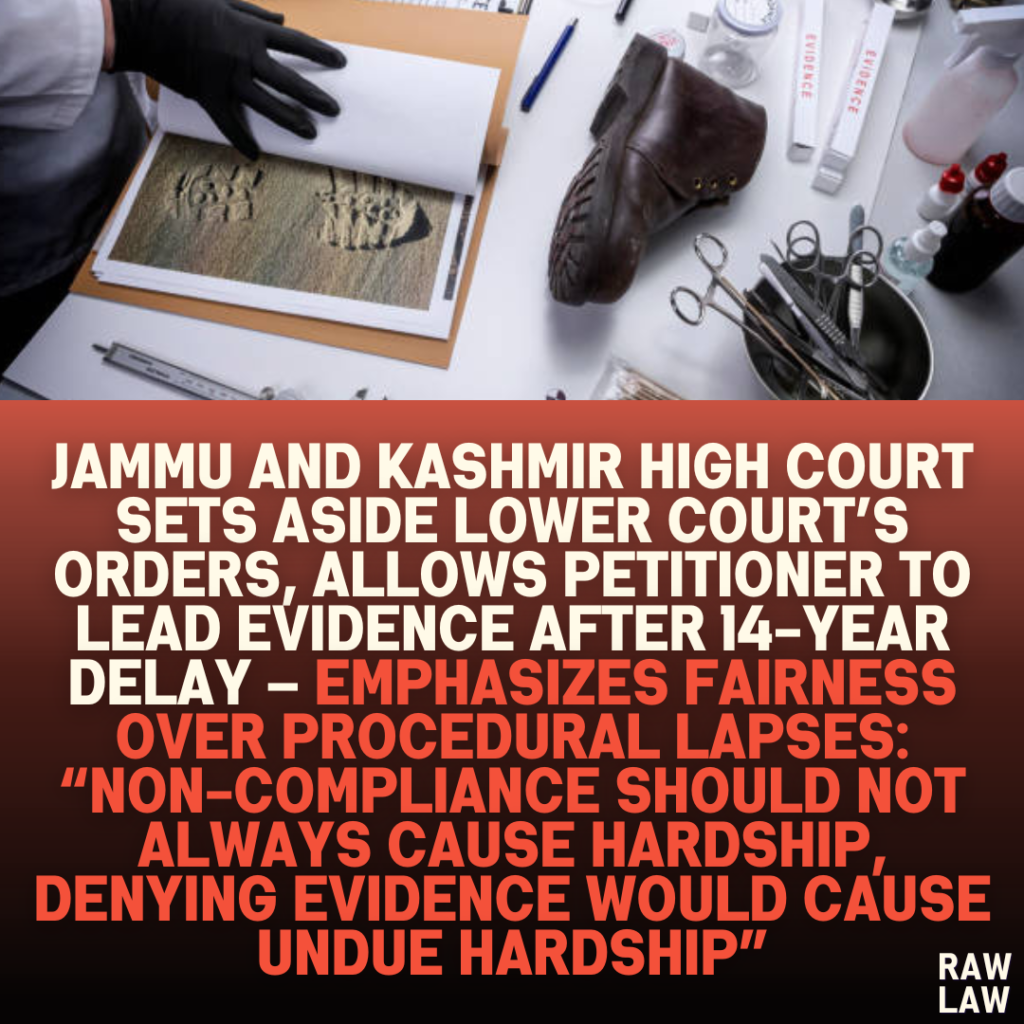Court’s Decision:
The Jammu and Kashmir High Court set aside the orders passed by the Civil Judge (Sr. Division) CJM, Kathua, which had closed the petitioner’s right to lead evidence due to procedural delays. The court held that while there may have been lapses by the petitioner, he should not be deprived of his right to lead evidence. The court allowed the petitioner to present evidence, subject to the payment of costs of Rs. 3000, and directed the petitioner to deposit witness expenses within fifteen days.
Facts:
The petitioner had filed a suit where issues were framed in 2010, and preliminary matters were decided the same year. However, due to confusion and delays, exacerbated by the COVID-19 pandemic and concurrent cases between the same parties, the petitioner failed to examine witnesses and deposit witness expenses in time. The trial court had closed the petitioner’s right to lead evidence in 2022 and dismissed the application to deposit witness expenses in 2023.
Issues:
The primary issue was whether the petitioner should be allowed to lead evidence in his case despite procedural delays and non-compliance with earlier court orders.
Petitioner’s Arguments:
The petitioner argued that the delays were due to confusion between multiple suits and complications arising from COVID-19 restrictions. The petitioner had submitted a list of witnesses and sought to deposit expenses, but the trial court closed the opportunity to lead evidence.
Respondent’s Arguments:
The respondent contended that the petitioner had not satisfactorily explained the delay and that the petitioner had not been diligent in complying with procedural requirements. They argued that the petitioner should not be allowed to lead evidence given the long-standing failure to produce witnesses or deposit expenses.
Analysis of the Law:
The court considered the procedural delays under the Civil Procedure Code. It noted that while procedural mandates must generally be followed, rigid adherence to them should not result in undue hardship or deprivation of a party’s right to present their case. The court emphasized that procedural non-compliance should not always lead to extreme consequences, especially when the case remains in its early stages.
Precedent Analysis:
Though no specific precedents were cited, the court’s reasoning aligns with broader principles of fairness and access to justice, where courts are reluctant to penalize parties too harshly for procedural lapses, especially when the case has not advanced significantly.
Court’s Reasoning:
The court held that although the petitioner had been at fault for not pursuing the suit diligently, the overall circumstances justified allowing the petitioner to lead evidence. The case had been pending for over 14 years, but it was still in its early stages. The court found that denying the petitioner an opportunity to present evidence would cause undue hardship.
Conclusion:
The High Court set aside the lower court’s orders and allowed the petitioner to lead evidence, provided that witness expenses were deposited within fifteen days and a cost of Rs. 3000 was paid to the respondent. The court also allowed the trial court discretion to dispense with unnecessary witnesses. The parties were directed to appear before the trial court in early November 2024.
Implications:
This judgment emphasizes that procedural non-compliance should not always be met with harsh penalties, especially when it threatens to undermine a party’s right to a fair hearing. It underscores the judiciary’s willingness to balance procedural rigor with fairness, particularly in cases where delays have not significantly progressed the litigation.




Pingback: Sikkim High Court Grants 278-Day Delay Condonation in Civil Revision Petition Filing, Citing “Sufficient Cause” and “Credible and Justified” Explanation; Hearing Scheduled for October 28 - Raw Law
Pingback: Bombay High Court Dismisses Petition on Grounds of Delay and Lack of Follow-Up in Land Acquisition Case, Emphasizing Petitioners' Inaction as Defeating Equitable Jurisdiction under Article 226" - Raw Law